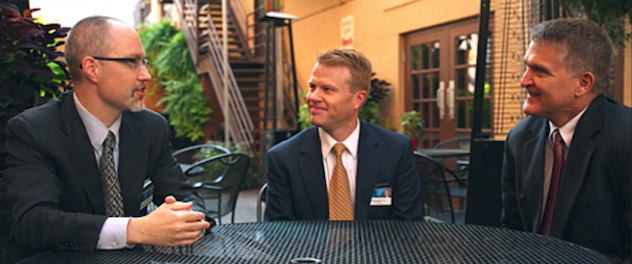
Nearly 2,000 physicians and scientists at Mayo Clinic are engaged in COMPASS groups, where they regularly meet for a meal to discuss common issues physicians face and cultivate connection.
Research Translated Into Strategies in Practice
The Mayo Clinic Program on Physician Well-Being is an organizational program to support research and interventions designed to promote physician well-being.
National benchmarks
Mayo Clinic regularly measures burnout and satisfaction with work-home integration among physicians. Data are benchmarked against national data provided by the program.
When levels of burnout are higher or satisfaction with work-home integration is lower than in national samples of similar specialty professionals, local factors are likely to play a substantial role. In such a scenario, organizational resources are deployed to address these factors.
New metrics
As the 22-item Maslach Burnout Inventory is impractical to use at an organizational level to regularly measure physician burnout, program investigators identified single-item questions with the highest factor loading on the emotional exhaustion and depersonalization subscales of the Maslach Burnout Inventory. The two items have been validated in a sample of more than 10,000 trainees and physicians. These two items are now part of biannual all-staff surveys at Mayo Clinic.
Program investigators developed and validated the Physician Well-Being Index. The index is a simple screening tool that evaluates multiple relevant dimensions of distress and well-being that can be used by physicians and other health care professionals at regular intervals to assess the current level of distress and well-being. The assessment includes versions applicable to trainees, nurses, advance practice professionals and other U.S. workers.
Mayo Clinic Well-Being Index tool
Self-assessment of one's level of distress is difficult, even for physicians. In a study involving over 1,100 U.S. surgeons, the surgeons' subjective self-assessment of their well-being relative to colleagues was poor with 89% believing their well-being was at or above average.
In response, the online Well-Being Index was developed. This web-based self-assessment tool, based on the well-validated well-being index., allows individuals to anonymously assess their level of well-being. They receive immediate feedback on how their level of well-being compares to peers — medical students, residents, physicians, nurses, advance practice professionals and other U.S. workers — locally as well as nationally. In addition, the online Well-Being Index provides information about local and national resources to help promote wellness.
The tool has been used by more than 35,000 individuals and takes less than one minute to complete. Use of an electronic version of the Physician Well-Being Index has been shown to improve self-calibration and promote behavioral change to improve personal well-being.
De-identified, aggregate data at the level of undergraduate medical education, graduate medical education, and institution and organization are used to generate customized reports with comparative normative data.
The online Well-Being Index is free for research use and for use in quality improvement efforts by nonprofit organizations. The interactive version of the index that provides personalized feedback to individuals and links to national resources is also free for individual use. The organizational version of the interactive Physician Well-Being Index that provides individualized feedback, links to local and national resources and organization level reports is also available but requires a fee for use. Access to the tool and information regarding cost and permission to use the tool is available at the Well-Being Index website.
Leadership scorecard
Leaders have a critical role in the well-being of their staff members. In the program's study of over 2,800 physicians, composite leadership scores of immediate physician supervisors strongly correlated with burnout and satisfaction scores of individual physicians.
On multivariate analysis, each one-point increase in leadership score was associated with a 3.3% decrease in burnout and a 9% increase in satisfaction. Leadership scores are obtained biannually at Mayo Clinic with tailored leadership training for those leaders with suboptimal scores.